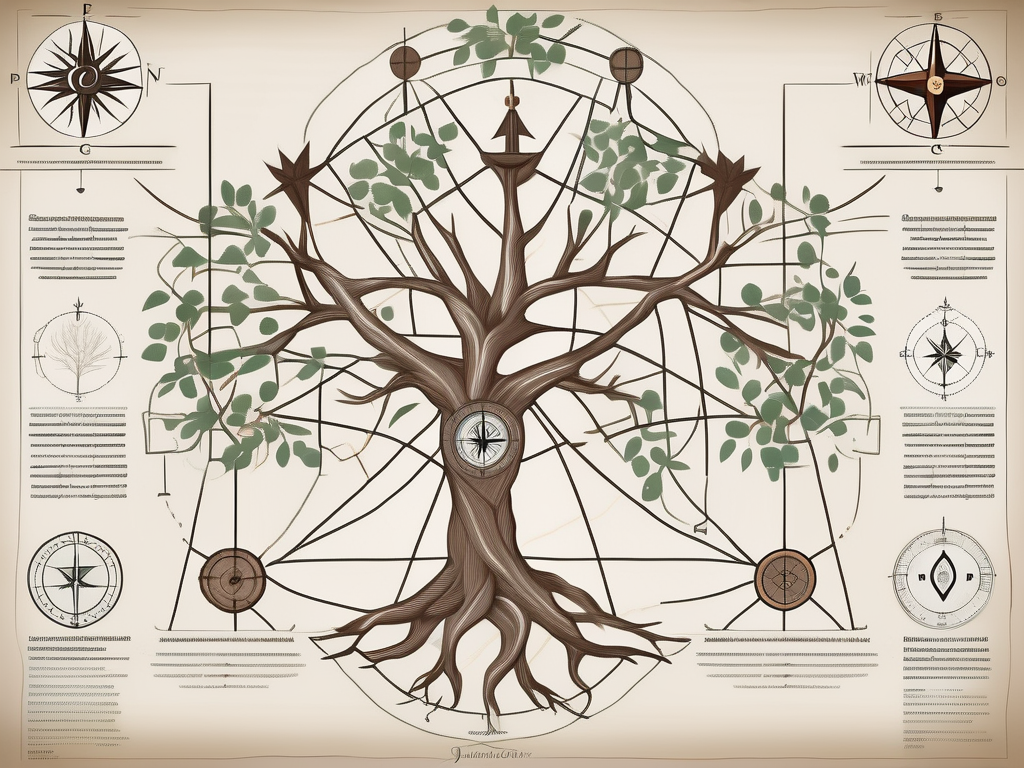Family is a foundational institution that holds immense significance in society. It is a unit where love, support, and growth are cultivated. For those seeking guidance on the subject, the Bible provides a rich source of wisdom and teachings. Let’s explore what the Bible has to say about family and the principles it offers for building healthy relationships.
Understanding the Concept of Family in the Bible
In order to grasp the Bible’s perspective on family, it is essential to understand its historical and cultural context. Family in the Old Testament revolved around lineage, genealogy, and communal living. In contrast, the New Testament emphasizes family as a spiritual bond, rooted in faith and love.
The Old Testament’s Perspective on Family
The Old Testament presents family as the foundation of society, with multiple generations living together under one roof. It places great value on honoring one’s elders, showing respect and obedience.
Throughout the Old Testament, the importance of family lineage is evident in many stories. Genealogies were meticulously recorded to establish a sense of identity and connection to God’s chosen people.
For example, in the book of Genesis, the genealogy of Adam to Noah is meticulously detailed, highlighting the significance of tracing one’s ancestry. This emphasis on lineage not only served to establish a person’s identity but also to reinforce the idea of belonging to a chosen people.
Furthermore, communal living was a common practice in the Old Testament. Families would often live in close proximity, sharing resources and supporting one another. This communal lifestyle fostered a sense of unity and interdependence among family members.
The New Testament’s Perspective on Family
The New Testament places greater emphasis on spiritual connections rather than biological ties. In the New Testament, Jesus redefines the concept of family, emphasizing the spiritual bond among believers as children of God.
Jesus’ teachings exemplify the importance of compassion, forgiveness, and love as the foundation for healthy family relationships. He challenges his followers to extend the definition of family beyond bloodlines and embrace a broader community.
For instance, in the Gospel of Mark, Jesus is asked about his biological family, to which he responds, “Whoever does the will of God is my brother and sister and mother” (Mark 3:35). This statement highlights the spiritual bond that surpasses biological relationships.
Moreover, the early Christian community in the New Testament is portrayed as a close-knit family. Believers supported one another, sharing their possessions and caring for those in need. This sense of unity and love within the Christian family was a testament to the transformative power of faith.
In conclusion, the concept of family in the Bible is multifaceted, encompassing both biological and spiritual dimensions. While the Old Testament emphasizes lineage and communal living, the New Testament highlights the importance of spiritual connections and the love shared among believers. Understanding the historical and cultural context of the Bible helps us appreciate the rich and complex understanding of family portrayed in its pages.
Biblical Teachings on Family Relationships
The Bible provides practical guidance for various family relationships, each highlighting valuable lessons that can be applied in our lives today.
Family is a foundational institution in society, and the Bible offers profound insights into the dynamics of different family relationships. Let us delve deeper into the teachings of the Bible on parent-child relationships, sibling relationships, and extended family relationships.
Parent-Child Relationships in the Bible
The Bible stresses the significance of honoring parents and taking care of one’s children. It emphasizes the responsibility of parents to nurture and guide their children, teaching them about God’s love and righteousness.
One example of a strong parent-child relationship in the Bible is the bond between Joseph and his father Jacob. Despite facing many challenges, Joseph remained obedient and respectful towards his father, showcasing the importance of honoring and obeying parents.
Additionally, children are encouraged to respect their parents’ authority, showcasing the importance of obedience and gratitude. The story of the prodigal son teaches us about the power of forgiveness and reconciliation, highlighting the importance of maintaining a loving and supportive relationship with our parents.
Sibling Relationships in the Bible
The Bible also explores sibling relationships, revealing both positive and challenging dynamics. It includes stories of loyalty, such as the bond between David and Jonathan, as well as conflicts like the rivalry between Cain and Abel.
These accounts teach us valuable lessons on love, forgiveness, and the importance of resolving conflicts within the family. The story of Joseph and his brothers demonstrates the power of forgiveness and reconciliation, showing us that even the most broken relationships can be restored through love and forgiveness.
Furthermore, the story of Jacob and Esau highlights the consequences of jealousy and deceit within sibling relationships. It reminds us of the importance of honesty, trust, and unconditional love in maintaining healthy relationships with our siblings.
Extended Family Relationships in the Bible
Extended family relationships are also highlighted in the Bible. Abraham and Lot, for example, demonstrate the complexities of family dynamics, including the importance of making wise choices and prioritizing healthy relationships.
Abraham and Lot faced challenges in their relationship due to their differing priorities and values. However, Abraham’s willingness to sacrifice and prioritize peace showcases the importance of maintaining harmony within extended family relationships.
By examining the challenges faced by these biblical figures, we can gain insights into maintaining healthy extended family relationships today. The story of Ruth and Naomi also teaches us about the power of loyalty and selflessness within extended family relationships, reminding us of the importance of supporting and caring for our relatives.
As we explore the teachings of the Bible on family relationships, it becomes evident that these stories are not merely historical accounts but timeless lessons that can guide us in building strong and loving relationships within our own families. By studying and applying these teachings, we can create a foundation of love, respect, and unity that will strengthen our families and bring us closer to God’s purpose for our lives.
The Role of Family in Spiritual Growth
Beyond the responsibilities and dynamics, the Bible emphasizes the role of family as a crucial platform for spiritual growth and development.
Family is not just a unit for daily tasks and interactions, but it serves as a foundation for teaching and learning. It provides an ideal environment for imparting and receiving wisdom, where older generations can pass down their faith, values, and life lessons to younger ones. The Bible encourages parents to teach their children diligently, nurturing their spiritual growth.
Within the family, there is a beautiful intergenerational exchange of knowledge and experience. Children, in turn, are called to be receptive and willing to learn from their parents, appreciating the wisdom and experience they have to offer. This dynamic creates a sense of continuity and unity within the family, as each generation builds upon the spiritual foundation laid by those who came before.
The Importance of Family Worship
Worshiping together as a family strengthens the spiritual bond and cultivates a deeper relationship with God. The Bible encourages families to not only pray individually but to also pray together, study scripture, and participate in communal worship. These activities foster a shared sense of faith and commitment.
When families gather to worship, they create a sacred space where they can express their love and devotion to God as a unit. This collective worship experience allows family members to support and encourage one another in their spiritual journey. It is in these moments of worship that family members can share their struggles, victories, and prayers, creating an atmosphere of love and unity.
Furthermore, family worship provides an opportunity for parents to model a vibrant and authentic faith for their children. When children witness their parents’ dedication to God and their spiritual practices, it leaves a lasting impression on their hearts. They are more likely to develop a personal relationship with God and prioritize their own spiritual growth.
Family worship is not limited to formal religious rituals; it can also include acts of service and kindness towards others. Engaging in charitable activities as a family allows members to put their faith into action and make a positive impact on the world around them.
In conclusion, the role of family in spiritual growth goes beyond mere responsibilities and dynamics. It is a platform for teaching and learning, where wisdom is passed down from one generation to the next. Family worship strengthens the spiritual bond and cultivates a deeper relationship with God. By engaging in these practices, families create an atmosphere of love, unity, and growth, nurturing the spiritual development of each member.
Biblical Principles for a Healthy Family
The Bible outlines fundamental principles that contribute to building healthy, loving, and thriving families. These principles not only provide guidance but also offer a solid foundation for families to navigate the challenges of life together.
One of the key principles emphasized in the Bible is the importance of love as the foundation for all relationships within the family. It encourages spouses to love and cherish one another, promoting harmony and fostering a safe environment where everyone feels valued. Love is not just a feeling but a choice to actively show care, kindness, and selflessness towards one another.
Respect is also crucial in maintaining healthy family dynamics. The Bible teaches children to honor their parents and encourages mutual respect between family members, promoting healthy communication and understanding. When respect is present, conflicts are resolved with grace and humility, and relationships are strengthened.
Forgiveness and reconciliation are also significant principles highlighted in the Bible. The Scriptures recognize that conflicts and misunderstandings are inevitable within families. However, it emphasizes the importance of forgiveness, reconciliation, and seeking peace. By practicing forgiveness, families can heal wounds and restore broken relationships, fostering unity and growth.
The story of Joseph forgiving his brothers serves as a powerful example of the transformative nature of forgiveness within a family setting. Despite the betrayal and mistreatment he experienced, Joseph chose to extend forgiveness to his brothers, leading to reconciliation and the restoration of their family bond. This story teaches us that forgiveness has the power to heal deep wounds and bring about reconciliation, even in the most challenging circumstances.
Furthermore, the Bible provides practical wisdom for parents on how to raise children in a healthy and godly manner. It encourages parents to teach their children about God’s commandments and to lead by example, instilling values of integrity, honesty, and compassion. By imparting these principles to their children, parents can equip them to navigate the complexities of life and build strong foundations for their own families in the future.
In conclusion, the Bible offers timeless principles that can guide families towards health, love, and unity. By embracing these principles and applying them in their daily lives, families can experience the blessings of strong relationships, forgiveness, and reconciliation.
The Bible’s View on Family Challenges
Family life is not without its challenges. However, the Bible offers wisdom and guidance on navigating these difficulties in a way that promotes growth and healing.
The Bible recognizes that conflict is an inevitable part of family life. It acknowledges that disagreements and misunderstandings can arise, causing tension and strain within relationships. However, it encourages individuals to approach these conflicts with wisdom and humility.
One of the key teachings of the Bible is the importance of communication. It emphasizes the need to express ourselves with love and respect, even in the midst of disagreement. By speaking truthfully and compassionately, we can foster understanding and create an environment where conflicts can be resolved.
Furthermore, the Bible teaches us the value of seeking reconciliation. Rather than harboring grudges or holding onto resentment, it encourages us to actively pursue peace and restoration. This involves taking responsibility for our own actions, apologizing when necessary, and extending forgiveness to others.
Resolving conflicts in a biblical manner not only strengthens familial bonds but also honors God. It reflects the principles of love, forgiveness, and reconciliation that are central to the teachings of Jesus Christ.
Overcoming Loss and Grief in the Family
Loss and grief can profoundly impact families, leaving them feeling overwhelmed and broken-hearted. In times of sorrow, the Bible offers solace and hope, reminding us of God’s presence and comfort.
Throughout the Bible, we find stories of individuals who experienced deep loss and grief. One such example is the story of Job. Job faced unimaginable tragedy, losing his wealth, health, and even his children. Yet, in the midst of his suffering, he clung to his faith and found solace in God’s love and faithfulness.
Job’s story teaches us that even in the face of immense loss, God can bring healing and restoration to grieving families. It reminds us that we are not alone in our pain and that God is near to the broken-hearted.
Moreover, the Bible encourages families to support one another during times of loss and grief. It emphasizes the importance of coming together as a community, offering comfort, and providing practical assistance to those who are hurting.
By turning to the Bible, families can find guidance and strength in navigating the challenges of loss and grief. Its teachings remind us that there is hope beyond our pain and that God’s love can bring healing and restoration to even the most broken of hearts.
In Conclusion
The Bible provides a wealth of wisdom on the subject of family. Its teachings encompass diverse aspects of familial relationships and provide guidance on building healthy foundations, cultivating spiritual growth, and navigating challenges within families. By applying these biblical principles, we can lay a solid groundwork for thriving family relationships that honor God and foster love and unity.












